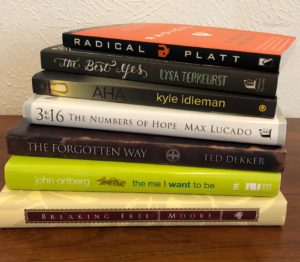 “All Scripture is God-breathed and is useful for teaching, rebuking, correcting and training in righteousness, so that the servant of God[a] may be thoroughly equipped for every good work.” (2 Tim 3:16-17)
“All Scripture is God-breathed and is useful for teaching, rebuking, correcting and training in righteousness, so that the servant of God[a] may be thoroughly equipped for every good work.” (2 Tim 3:16-17)
For as long as I can remember, I’ve loved to read. However, I haven’t always loved reading nonfiction. As a teenager, I tried to read spiritual growth books, but the few I picked out had messages that seemed to be written for other people. For many years after that, I avoided reading nonfiction, including spiritual growth books.
A few years ago, I noticed a tremendous surge in the number of spiritual growth books on the market, and I decided I was ready to try the genre again. I carefully chose the books I felt I could best apply to my life.
Since then, I’ve set a goal to read at least one spiritual growth book a month. I started 2019 with The Best Yes by Lysa Terkeurst and then moved onto Aha by Kyle Idleman. Reading spiritual growth books has many benefits, and some of the one I’ve seen include the following:
- Learning. I took the Clifton StrengthsFinder test last year and discovered something that I already knew about myself: one of my strengths is learning. But there’s plenty I don’t know or understand about myself, and reading spiritual growth books has helped with this. Through the course of my studies, I’ve also learned to recognize when I’m reading something that isn’t theologically sound. The best part, though, is that I’m learning more about the Lord and how I can use the gifts and strengths he gave me to relate to the people and the world around me.
- Attitude. Reading spiritual growth books helps me have a more positive attitude. Instead of filling my mind with negative things, I’m thinking about “whatever is true, whatever is noble, whatever is right, whatever is pure, whatever is lovely, whatever is admirable” (Phil 4:8). Spiritual growth books are like food for the soul.
- Communication. When I read spiritual growth books, I hear from God. While I don’t hear an audible voice, I hear him through the authors’ words and the examples they use. I feel a stirring when I read something I need to pay attention to. Our relationship with God is like any other relationship in that we have to communicate and spend time with him in order to get to know him better.
- Application. Reading books is the first step; applying what I’ve learned is the next step. When I read something that speaks to me, I can’t help but implement it so that I can draw closer to God.
Of course, the Bible is the ultimate book and source of information to learn about God and how to be like Jesus. When I read spiritual growth books written by mere men and women, I must weigh the information in each book against the Bible to discover whether the author is presenting God’s word or pushing his or her own agenda. Beginning with prayer helps us hear God’s voice through the author’s words and prepares us to listen.
Do you read spiritual growth books? What are you reading right now?
Dear Jesus, thank you for books that draw me closer to you. Help me to learn from others and apply the lessons to my own life. Amen.
Author’s Note: This post was originally published in my author newsletter on March 8, 2019. If you would like to be some of the first to see new content from me, sign up for my monthly newsletter.
I read more fiction than non-fiction, but I too have added the habit of at least one growth-oriented book per month. Often it is spiritual growth but I also include leadership development as well. My biggest stumbling block when it comes to non-fiction growth books is applying the new knowledge! I feel guilty when I don’t but yet it is hard for me to sit down and intentionally plan what to change, add, or subtract based on what I’ve read.